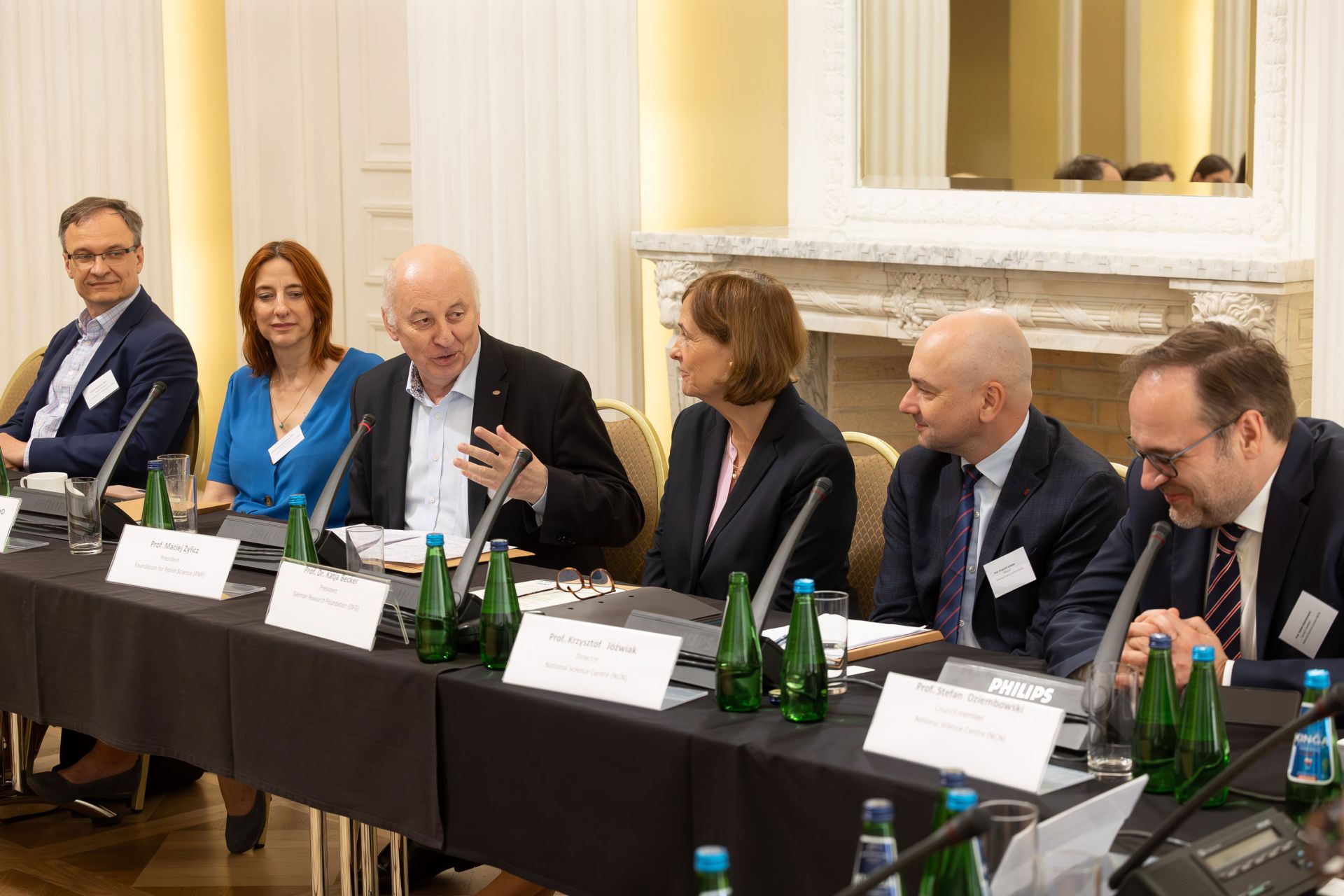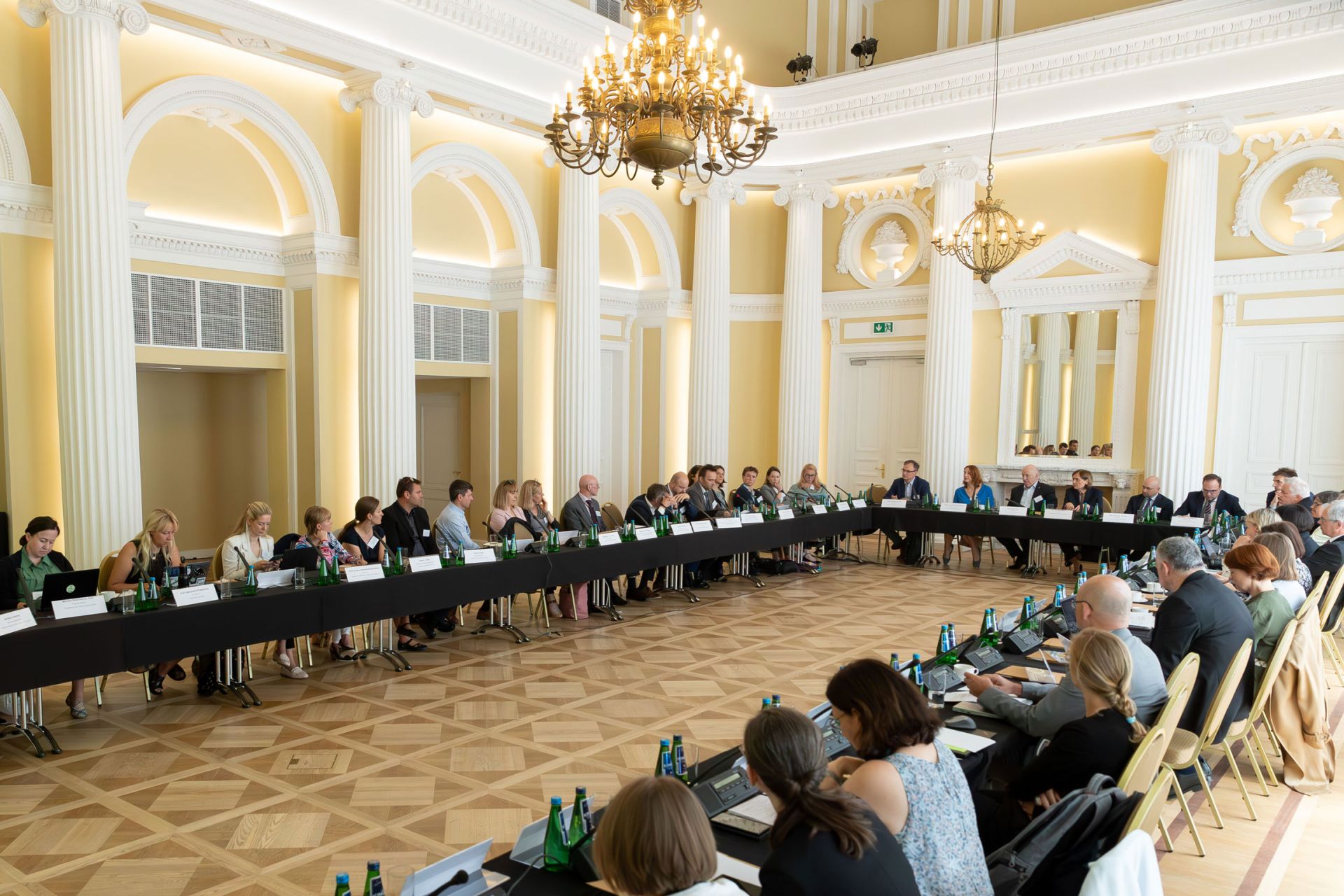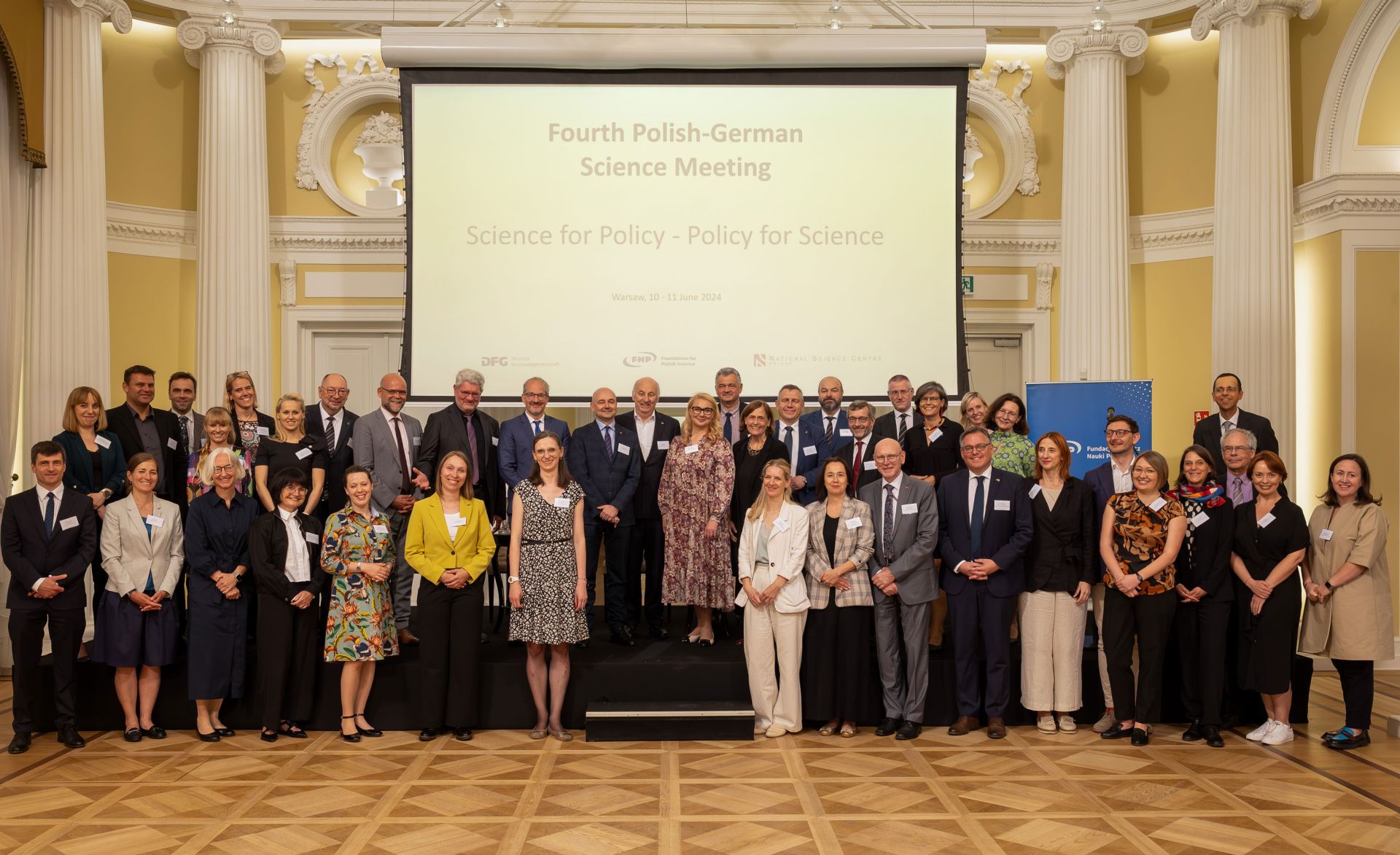“Science for Policy – Policy for Science” was the theme of the Fourth Polish-German Science Meeting, held on June 10–11 in Warsaw. The event was organized by the Foundation for Polish Science (FNP) in cooperation with Poland’s National Science Centre (NCN) and the German Research Foundation (DFG).
The meeting gathered heads and representatives of more than a dozen research and grant-giving institutions from Poland, Germany, along with both countries’ embassies. The event’s special guest was Olga Polotska, Ph.D., Executive Director of the National Research Foundation of Ukraine. The conference focused on the role of science diplomacy – primarily in the context of providing support and aid to Ukraine – as well as opportunities and challenges for science and scientists connected to artificial intelligence development.
 Photo by Paweł Kula/ FNP
The panel discussion on the first day focused on how to best support Ukrainian scientists and the science sector in Ukraine. Panelists foregrounded numerous bilateral initiatives between individual EU countries and Ukraine, highlighting the significant role of coordinated international efforts. From the perspective of the event participants, the most pressing challenges ahead will include the reconstruction of the destroyed Ukrainian research infrastructure and efforts aimed at persuading Ukrainian scientists to return to Ukraine and conduct research in their home country. The panel was moderated by Marta Łazarowicz-Kowalik, Ph.D., Deputy President of the FNP Board.
Photo by Paweł Kula/ FNP
The panel discussion on the first day focused on how to best support Ukrainian scientists and the science sector in Ukraine. Panelists foregrounded numerous bilateral initiatives between individual EU countries and Ukraine, highlighting the significant role of coordinated international efforts. From the perspective of the event participants, the most pressing challenges ahead will include the reconstruction of the destroyed Ukrainian research infrastructure and efforts aimed at persuading Ukrainian scientists to return to Ukraine and conduct research in their home country. The panel was moderated by Marta Łazarowicz-Kowalik, Ph.D., Deputy President of the FNP Board.
The second day concentrated on “Science for Policy: The Impact of AI on the Research,” so panelists discussed artificial intelligence and its use in conducting and evaluating research.
Discussions opened with a lecture “Generative AI Horizons: Collaborative Approach” by Professor Aleksandra Przegalińska from Kozminski University and Harvard University, a leading Polish expert in and researcher of AI.
The next item on the meeting’s agenda was the first panel “What AI Means for Conducting Research? Research Performing Organizations’ Perspective.” Panelists emphasized that we undoubtedly partake in a turning point in civilizational development, with AI providing unprecedented opportunities. Nevertheless, we must simultaneously remain mindful of the risks that the world of science faces. The most significant risks are to include deep fake technology, which enables the generation of fake scientific research results and their dissemination in the scientific world and the general public. The panelists highlighted the need to prepare regulations for the use of AI in research. As one of the challenges facing the EU, they mentioned the need to keep abreast of global competition in AI development and the necessity to attract talent. Tomasz Perkowski, Ph.D., Deputy President of the FNP Board, moderated this panel.
 Photo by Paweł Kula/ FNP
The second panel “What AI Means for Research Assessment? Research Funding Organizations’ Perspective” addressed the opportunities and challenges linked to using AI for the purpose of evaluating research funding applications. Is AI more objective than humans in assessing applications? Could AI make funding decisions instead of fallible humans? If we cannot fully “devolve” our authority to AI in evaluating and selecting applications, should we use this technology at all, and to what extent? These are but some of the questions debated during the panel chaired by Professor Stefan Dziembowski, a cryptographer and member of the National Science Centre Council. While AI is undoubtedly a valuable tool for improving work efficiency, the panel concluded that AI should play only a supporting and auxiliary role for people tasked with decision-making. Nevertheless, the panelists recognized the analytical capabilities of AI while noting the need to regulate matters of intellectual property.
Photo by Paweł Kula/ FNP
The second panel “What AI Means for Research Assessment? Research Funding Organizations’ Perspective” addressed the opportunities and challenges linked to using AI for the purpose of evaluating research funding applications. Is AI more objective than humans in assessing applications? Could AI make funding decisions instead of fallible humans? If we cannot fully “devolve” our authority to AI in evaluating and selecting applications, should we use this technology at all, and to what extent? These are but some of the questions debated during the panel chaired by Professor Stefan Dziembowski, a cryptographer and member of the National Science Centre Council. While AI is undoubtedly a valuable tool for improving work efficiency, the panel concluded that AI should play only a supporting and auxiliary role for people tasked with decision-making. Nevertheless, the panelists recognized the analytical capabilities of AI while noting the need to regulate matters of intellectual property.
The idea of holding regular Polish-German meetings emerged in 2017. The events provide a platform for discussion and exchange of experiences on current topics relevant to the scientific community. This year’s event held in Warsaw was already the fourth such initiative. The previous meetings were held in Munich in 2017, Krakow in 2019, and Berlin in 2022.
The next Polish-German Science Meeting will take place in 2026 in Germany.
Photos: Paweł KulaFourth Polish-German Science Meeting

Fot. Paweł Kula/ FNP
Source: FNP
